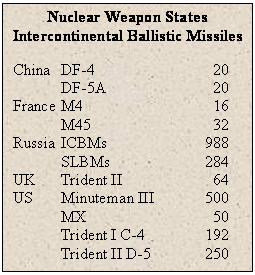Mutually assured destruction?
 I've written about this subject before, many times. Vital question being, what's inside Mr Ahmadinejad's mind.
I've written about this subject before, many times. Vital question being, what's inside Mr Ahmadinejad's mind.  So now we have a stand-off. Will there be a stand-down? Or shall this incident proceed through the usual path? That is, as time passes, the military force of a hostile opponent is always assumed to increase. Never decrease. When shall Iran have a military force capable of nuclear strikes? Ten years? Five? One? Are they there yet? What happens when either Iran or Israel fires a test blast?
So now we have a stand-off. Will there be a stand-down? Or shall this incident proceed through the usual path? That is, as time passes, the military force of a hostile opponent is always assumed to increase. Never decrease. When shall Iran have a military force capable of nuclear strikes? Ten years? Five? One? Are they there yet? What happens when either Iran or Israel fires a test blast?
Reuters on the same subject:
TEL AVIV (Reuters) - In October 1973, with its forces battling to repel invasions by Egypt and Syria, Israel did what had previously been unthinkable: It briefly wheeled its nuclear-capable Jericho-1 missiles out of their secret silos.
With Israel's current arch-foe Iran seen gaining the ability to produce nuclear weapons within a few years, and preventive military options limited, some experts now anticipate another "lifting of the veil" on the assumed Israeli atomic arsenal.
Were that to happen, experts say, the objective would be to establish a more open military deterrence vis-a-vis Iran and perhaps win Israel's nuclear option formal legitimacy abroad.
Talk of a nuclear stand-off between Israel and Iran has sparked comparisons with the "mutually assured destruction" formula that reigned during the Cold War and, more recently, between India and Pakistan. [..] But those precedents assume a parity that may not exist with Israel and Iran. Militarily advanced Israel is geographically small and vulnerable. Iran's atomic ambitions are at fledgling stage but its large size could help it survive a major strike.
There is also speculation that Ahmadinejad might welcome an apocalyptic confrontation, meaning the idea of a deterrent would not work.
"Israel cannot continue to rely on it (ambiguity policy) if Iran has nuclear weapons. This is because ambiguity leaves too many grey areas. The enemy cannot know with certainty what the red lines are and when he is risking an Israeli nuclear response," (Reuven Pedatzur, defence analyst) wrote.
"There must be a deterrent policy that will leave no room for misunderstandings," he added. "Thus, for example, we would make it clear that the identification of any missile launched from Iran in a westerly direction means, as far as we are concerned, the launch of an Iranian nuclear missile at us."Declaring capabilities is one way for a nation to becomes an official nuclear power. The other is a controlled atomic blast.
"If the Israelis really have any doubt about the credibility of their deterrence, they could conduct a nuclear test, say, in the Negev desert," said Gary Samore, a former adviser on nuclear non-proliferation in the U.S. National Security Council under President Bill Clinton.
"The sense of stability associated with mutually assured destruction grew out of a learning curve," [Avner Cohen] said. "Israel had its learning through crisis, especially the 1973 war. Do we have time for the Iranians to learn? Will they learn?"
-- lot


 Some texts in English also - please click
Some texts in English also - please click 


Ei kommentteja:
Lähetä kommentti